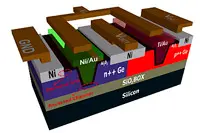 Researchers at Purdue University in the US have created what they believe is the first modern germanium circuit. The CMOS device is unusual in that it uses Ge as the semiconductor, instead of silicon.
Researchers at Purdue University in the US have created what they believe is the first modern germanium circuit. The CMOS device is unusual in that it uses Ge as the semiconductor, instead of silicon.
Germanium was originally the semiconductor of choice in the early days of the transistor – and Purdue was instrumental in its creation in 1947 by providing purified germanium. However, Ge was superseded by silicon. Now, with silicon transistors reaching a scaling limit, Ge is being considered as a replacement for silicon.
Previously, germanium has been limited to p-type devices. However, in recent work, Purdue researchers have shown that Ge can be used to create n-type transistors and hence CMOS electronic devices. The team will present its findings at the forthcoming International Electron Devices Meeting in San Francisco.
By doping germanium and then etching away the top layer, recessed channels are created which serve as gates, allowing the transistors to switch on and off.
According to the team, the fundamental part of the device – the inverter – is the best performing non silicon inverter demonstrated so far, with a gain of 36V/V.
Germanium based devices have been fabricated with channel lengths as small as 20nm and the research has also addressed NAND and NOR logic gates.
Author
Graham Pitcher
Source: www.newelectronics.co.uk
